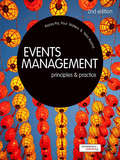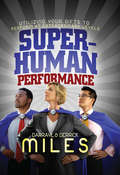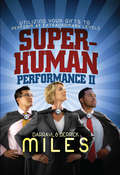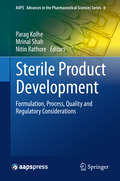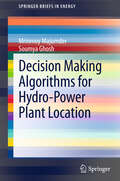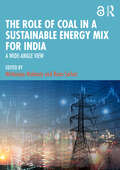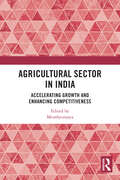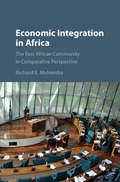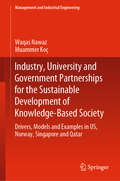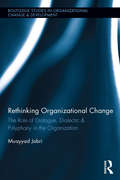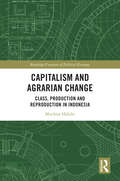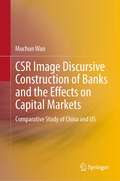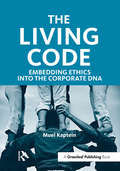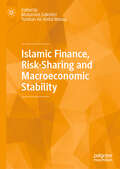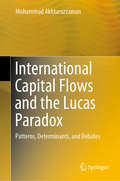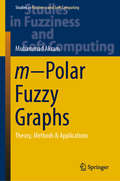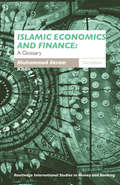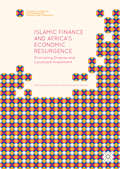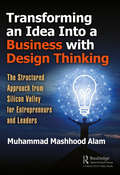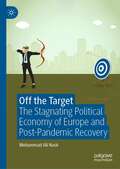- Table View
- List View
Events Management: Principles and Practice
by Razaq Raj Paul Walters Mr Tahir RashidThe new edition of this popular accessible text gives students a thorough and contemporary grounding in both the fundamentals and strategic responsibilities of successful event management. Purposefully broad in scope, the text combines theory with practical knowledge and terminology, ensuring readers develop a flexible and commercially-acute skill set. <P><P> Topics covered range from law, marketing and finance to introductory guides to sound, lighting and multimedia equipment, providing students with the practical knowledge they need for a career in Events Management. Theory is brought to life in a range of case studies and examples throughout the text. <P> As well as updated examples and legislation, this edition introduces new chapters on:<P> * Event entrepreneurship<P> * Project management and financing<P> * New Multimedia technology for events organisers<P> * Sustainable festivals and events<P> * Long term legacy and impacts<P> * The future of the industry<P> An accompanying Companion Website provides students with discussion questions and video links. The website also provides an Instructor's Manual and PowerPoint slides for lecturers. <P> This text is an ideal resource for undergraduate students who are studying Events Management for the first time. <P> Visit the Companion Website at www.sagepub.co.uk/raj
Superhuman Performance I: Utilizing Your Gifts to Perform at Extraordinary Levels
by Mr. Derrick Miles Mr. Darrayl MilesYour potential extends far beyond your capabilities and skills, exceeding your limited imagination. This book will help you discover your gifts and understand why you come alive, for what purpose. You will learn how to deploy your gifts for lasting success. Deep in your heart you know you were made for more than just a job (just over broke). You were made to create and conquer, to find adventure in your labor and beauty in your craft. You were made to make a difference. Knowing you&’re destined for superhuman success is not enough. You must use your spiritual gifts and that takes courage. This book will help you find the faith to discover your superhuman &“talents&” and unleash their power.
Superhuman Performance II: Utilizing Your Gifts to Perform at Extraordinary Levels
by Mr. Derrick Miles Mr. Darrayl MilesWith compelling insights and practical applications from some of the world’s top entrepreneurs, you will gain a fresh understanding of what it means to live within a cone of excitement, anticipation and purpose. You will learn how to reclaim your sense of wonder, replacing worry with hope, fear with faith. This book weaves the personal insights of today’s top leaders with true-life examples, offering profound wisdom and practical advice for how you can lead a life of adventure and abundance. Now is the time to move beyond the mundane of mediocrity and master your domain. Let your journey begin.
Colonializing Agriculture: The Myth of Punjab Exceptionalism (SAGE Series in Modern Indian History)
by Mridula MukherjeeThis book is the first comprehensive study of the impact of colonialism on the agriculture of this very important region which, apart from the Pakistani and Indian provinces of Punjab, included the present day Indian provinces of Haryana and Himachal Pradesh. Making extensive use of data culled from government archives and private papers in India and Britain, as well as from village surveys, farm accounts and family budgets, the author argues that Punjab was by no means an idyllic land of prosperous peasant proprietors. She maintains that it was also the land of big feudal landlords, rack-rented tenants, and struggling small-holders, who were forced to enlist in the army or migrate to enable their families to pay government taxes and to repay debts. Comparing Punjab with its supposed polar-opposite, the eastern region of Bengal and Bihar, Mridula Mukherjee demonstrates that Punjab too had begun to exhibit features typical of colonial under-development, such as stagnation of productive forces, intensification of semi-feudal relations, forced commercialisation and lack of capital investment in agriculture. The green revolution therefore was not the result of a continuity but actually because of a break with the colonial past.
The Climate Solution: India's Climate-Change Crisis and What We Can Do about It
by Mridula RameshFrom fatal heatwaves and cruel droughts to devastating floods and fast-depleting water tables, climate change is the greatest disruptor of our time ? and it can no longer be ignored. For most of us the odds seem overwhelming and solutions seem out of reach. Yet, in this forcefully argued book, climate change practitioner, teacher and investor Mridula Ramesh emphasizes that while the situation is grim, it is not without hope. Drawing on her extensive practical and investing experience, she explores myriad facets of this raging issue: why women are peculiarly affected by a warming climate; how climate change poses a security threat to the Indian state; why just focussing on green sources of power is an incomplete solution for India; how managing waste can create hundreds of thousands of urban jobs and how households can cope in a `Day Zero? water situation. In doing so, she shows how climate warriors, from the cotton fields of Punjab and thriving eco start-ups in Bengaluru, to a forest guardian in Assam and the johads of Rajasthan, have employed ingenuity and initiative to adapt to the changing conditions ? and sometimes reverse their shattering effects. Timely, urgent and thought-provoking, this book is an urgent call to action ? and an essential manifesto for every Indian citizen to follow.
Sterile Product Development
by Parag Kolhe Mrinal Shah Nitin RathoreThis comprehensive book encompasses various facets of sterile product development. Key concepts relevant to the successful development of sterile products are illustrated through case studies and are covered under three sections in this book: * Formulation approaches that discuss a variety of dosage forms including protein therapeutics, lipid-based controlled delivery systems, PEGylated biotherapeutics, nasal dosage form, and vaccines * Process, container closure and delivery considerations including freeze-thaw process challenges, best practices for technology transfer to enable commercial product development, innovations and advancement in aseptic fill-finish operations, approaches to manufacturing lyophilized parenteral products, pen / auto-injector delivery devices, and associated container closure integrity testing hurdles for sterile product closures * Regulatory and quality aspects in the areas of particulate matter and appearance evaluation, sterile filtration, admixture compatibility considerations, sterilization process considerations, microbial contamination investigations and validation of rapid microbiological methods, and dry and moist heat sterilizers This book is a useful resource to scientists and researchers in both industry and academia, and it gives process and product development engineers insight into current industry practices and evolving regulatory expectations for sterile product development.
Application of Geographical Information Systems and Soft Computation Techniques in Water and Water Based Renewable Energy Problems (Water Resources Development and Management)
by Mrinmoy MajumderThis book highlights the application of Geographical Information System (GIS) and nature based algorithms to solve the problems of water and water based renewable energy resources. The irregularity in availability of resources and inefficiency in utilization of the available resources has reduced the potentiality of water and water based renewable energy resources. In recent years various soft computation methods (SCM) along with GIS were adopted to solve critical problems. The book collects various studies where many SCMs were used along with GIS to provide a solution for optimal utilization of natural resources for satisfying the basic needs of the population as well as fulfilling their burgeoning energy demands. The articles depict innovative application of soft computation techniques to identify the root cause and to mitigate the uncertainty for optimal utilization of the available water resources. The advantage of SCM and GIS were used to maximize the utilization of water resources under cost and time constraints in face of climatic abnormalities and effect of rapid urbanization.
Decision Making Algorithms for Hydro-Power Plant Location
by Mrinmoy Majumder Soumya GhoshThe present study has attempted to apply the advantage of neuro-genetic algorithms for optimal decision making in maximum utilization of natural resources. Hydro-power is one of the inexpensive, but a reliable source of alternative energy which is foreseen as the possible answer to the present crisis in the energy sector. However, the major problem related to hydro-energy is its dependency on location. An ideal location can produce maximum energy with minimum loss. Besides, such power-plant also requires substantial amount of land which is a precious resource nowadays due to the rapid and uncontrolled urbanization observed in most of the urban centres in the World. The feasibility of such plants also depends on social acceptance as well as the level of environmental casualty and economic benefit, all of which is also spatially dependent. Decision making algorithms are applied to identify better solution if a problem has more than one alternative explication. Nature based algorithms are found to be efficient enough to catalyze such kind of decision making analysis. That is why the present study tries to utilize nature based algorithms to solve the problems of location selection for hydropower plants. The study employed six different types of nature based algorithms to select one of the locations among many available for installation of hydropower plant in the North Eastern part of the Indian subcontinent. The locations are selected based on their in stream resources and included in the decision making as alternatives. A methodology of criteria selection, determination of weightage and applications of bioinspired algorithms are adopted to produce utmost exertion of the available natural resources with minimum hostility and wastage of the same.
The Role of Coal in a Sustainable Energy Mix for India: A Wide-Angle View
by Mritiunjoy Mohanty and Runa SarkarAs India switches away from a coal-based to a more sustainable energy use pattern, which pathway will it adopt? What is the nature of challenges that it will face, and who will be affected? Who will gain? This volume offers insights into the steps and challenges involved in this transition and addresses some urgent questions about the possible pathways for India’s renewable energy generation. Including contributions from researchers, policymakers, and practitioners, it draws on different disciplines, ranging from science and technology to economics and sociology, and situates the issue of low carbon transition within an interdisciplinary framework. India has committed to gradual decarbonisation of its economy. This book takes this as its starting point and uses a wide-angle lens, incorporating macro as well as micro views, to understand the possible next steps as well as trade-offs that will inevitably be posed. It incorporates the perspectives of all stakeholders ranging from central and state governments, public and private sector firms, on the one hand, to individuals and local communities, on the other, to explore their role in the transition, their interests, and how these will change and evolve. This timely volume will be of interest to students and researchers of environmental studies, development studies, environmental economics, political studies, and Asian studies. It will also be useful to academics, practitioners, and policymakers working on issues related to climate change, sustainable development, energy policy and economics,and public policy.
Agricultural Sector in India: Accelerating Growth and Enhancing Competitiveness
by MruthyunjayaThis book presents a comprehensive overview of a range of concepts, methods, strategies and policies in agriculture and natural resource management, environmental economics, production economics and sustainable agricultural development. It explores effective analytical tools and science, innovations, and management solutions to enhance yields, manage the supply chain, strengthen institutional mechanisms, and service and support systems for farmers. It highlights the importance of enabling policies which can benefit farmers, resulting in cost-efficient and quality-improving farm practices, increased profits and income for farmers, and better management of natural resources. The essays in the book honour the academic, teaching, and research contributions of Professor R. Ramanna in the field of agricultural economics. They also address issues which are relevant to the growing research in sustainable agricultural development and natural resource management including the use of new concepts, tools, analyses, technologies, innovations, and policy strategies modelled in local contexts that can easily be scaled and applied to similar contexts elsewhere. This book will be of interest and use to students, researchers, practitioners,and policymakers working in varied fields of agricultural economics, sustainable development, public policy, rural sociology, political economy, economics of innovation, institutional economics, and industrial organisation.
Economic Integration in Africa: The East African Community in Comparative Perspective
by Richard E. MshombaIn this work, Richard E. Mshomba offers an in-depth analysis of economic integration in Africa with a focus on the East African Community (EAC), arguably the most ambitious of all the regional economic blocs currently in existence in Africa. Economic Integration in Africa provides more than just an overview of regional economic blocs in Africa; it also offers a rich historical discussion on the birth and death of the first EAC starting with the onset of colonialism in the 1890s, and a systematic analysis of the birth, growth, and aspirations of the current EAC. Those objectives include forming a monetary union and eventually an East African political federation. This book also examines the African Union's aspirations for continent-wide integration as envisioned by the Abuja Treaty. Mshomba carefully argues that maturity of democracy and good governance in each country are prerequisites for the formation of a viable and sustainable East African federation and genuine continent-wide integration.
Electronic Waste and Printed Circuit Board Recycling Technologies (The Minerals, Metals & Materials Series)
by Muammer KayaThis book covers state-of-the-art technologies, principles, methods and industrial applications of electronic waste (e-waste) and waste PCB (WPCB) recycling. It focuses on cutting-edge mechanical separation processes and pyro- and hydro-metallurgical treatment methods. De-soldering, selective dismantling, and dry separation methods (including the use of gravity, magnetic and electrostatic techniques) are discussed in detail, noting the patents related to each. The volume discusses the available industrial equipment and plant flowsheets used for WPCB recycling in detail, while addressing potential future directions of the field. This practical, comprehensive, and multidisciplinary reference will appeal to professionals throughout global industrial, academic and government institutions interested in addressing the growing problem of e-waste. Covers principles, methods and industrial applications of e-waste and PCB recycling;Details state-of-the-art mechanical separation processes and pyro- and hydro-metallurgical treatment methods; Describes the available industrial equipment used and plant flowsheets for PCB recycling and addresses potential future developments of this important field.
Industry, University and Government Partnerships for the Sustainable Development of Knowledge-Based Society: Drivers, Models and Examples in US, Norway, Singapore and Qatar (Management and Industrial Engineering)
by Muammer Koç Waqas NawazThis book discusses the rapidly growing interest in economic diversification through partnerships between industry, university and government (IUGP), with a focus on the economic diversification of the state of Qatar. It provides a comparative account of the knowledge ecosystem in the USA, Norway, Singapore and Qatar, and offers an evolutionary, national economic-transformational perspective on legislation, institutional and cultural settings, intermediary structures, and support programs. Providing a broad overview of the knowledge ecosystems in these countries, it is suitable for readers at various learning levels. It also includes case studies and a concise comparison of the Global Innovation Index (GII) of the four countries, and explores in detail the under-par comparative performance of Qatar, revealing that the country is still at the engagement level of IUGP. Further, it proposes evidence-based recommendations and strategies, making it a valuable resource for researchers, graduate students and policymakers.
Rethinking Organizational Change: The Role of Dialogue, Dialectic & Polyphony in the Organization (Routledge Studies in Organizational Change & Development #14)
by Muayyad JabriRethinking Organizational Change: The Role of Dialogue, Dialectic & Polyphony in the Organization makes an important scholarly contribution to our understanding of dialogue applied to the management of change. Muayyad Jabri offers an involved assessment of the differences between 'dialogue’ and ‘dialectic’ and an intriguing invitation to rely on both for managing creative interventions into the change process. The book provides a surplus of new insights that will help to promote scholarly work in the area of managing change and to develop a more creative practice associated with the processes of managing change. The call for polyphony facilitates a crossover from sameness to diversity and from univocal to multivocal representations. In reading patterns of managing change, whether from within or across organizational borders, it is found that a vital part of the reading is, at present, ‘unreadable’ because we lack involved knowledge of how diversity and polyphony are interrelated. This book seeks to change this; based on a rendition of Mikhail Bakhtin’s anthropological concept of polyphony applied to organizational change. The reader is treated to a cutting-edge discussion of a variety of contemporary ontological and epistemological themes centered on process, dialectic, dialogue and social construction.
Capitalism and Agrarian Change: Class, Production and Reproduction in Indonesia (Routledge Frontiers of Political Economy)
by Muchtar HabibiSmall-scale agricultural producers in the peripheral world are often condescendingly assumed to be a single social class (‘the peasantry’) to be pitted against the state or corporation. This book challenges this rather idealistic view by demonstrating that under current capitalist social relations (competition, efficiency and productivity, and profit maximisation), these agricultural producers have been differentiated into different agrarian classes by exploitation. By comparing two different contexts of local agrarian change in Indonesia—rice cultivation in Java and oil palm in Sumatra—this book exposes the different class locations of the agrarian classes among petty agricultural producers and the class relations between them. These are often inextricably linked to gender, clanship and generational issues. The power of class dynamics crucially shapes how agricultural production in both rice and oil palm is organised. The share received by different agrarian classes from the production site then prominently shapes the different nature of class reproduction for each agrarian class. This analysis demonstrates that the different agrarian classes possess different capacities and responses in their relation to the state or corporations. Any real emancipation attempt in the Indonesian countryside (and beyond) must start from a proper understanding of these class dynamics. This book marks a significant contribution to the literature on agrarian change, the political economy of development, rural development and Marxist political economy.
CSR Image Discursive Construction of Banks and the Effects on Capital Markets: Comparative Study of China and US
by Muchun WanThis book attempts to establish an inter-disciplinary discourse evaluation framework to analyze multi-dimensional discursive features along 4 dimensions in Chinese and American banks’ CSR reports: sentiment, readability, CSR keyword, and visualization. It analyzes Chinese and American banks’ different discursively constructed CSR images via the employment of various discursive features in CSR reports within their different contexts. Lastly, it examines the effects of Chinese and American banks’ discursively constructed CSR images on capital markets, with an inter-disciplinary approach of linguistics, management, and economics. Theoretically, this book contributes to the development of institutional identity’s cross-disciplinary research. Additionally, it reveals the problem-solving function of discourse. This sheds light on theoretical research into both corporate governance and business discourse. Practically, this book contributes to the improvement of Chinese banks’ awareness in CSR disclosure and the establishment of Chinese banks’ international images. Since more and more Chinese companies in different sectors are choosing overseas listings, findings in this book also have practical implications for their information disclosure, international images construction, and corporate value enhancement through corporate narratives, such as annual reports and IPO prospectuses.
The Living Code: Embedding Ethics into the Corporate DNA
by Muel KapteinOf the 200 largest organizations in the world, more than 80% currently have a corporate code of conduct. An ever larger number of smaller organizations also have a code or are in the process of developing one. While in the 1970s and 1980s companies had to explain why they had a code, today they are cross-examined if they don't have one. A company has to have very good arguments to convince stakeholders that they can do without a code.A business code is a measure for success: success as manager, employee, team and for the organization as a whole. Unfortunately, many codes are underutilized. And many simply fail, with serious repercussions for the organization.This short and accessible book presents a model to create, develop and embed business codes. The validated model enables managers and organizations to better manage their codes as well as their performance. The author articulates why a code of conduct is necessary, what it should cover, as well as demonstrating through practical tips and examples how to make full use of it. What is required to breathe life into a code and keep it that way? How can you live your code? Illustrated with results from an empirical study of the "Fortune" Global 200, the ideas developed are based on the worldwide experience of the consultancy firm KPMG. The author works in the field of developing, implementing and monitoring of codes, as well as conducting intensive academic research in the last 15 years in his capacity as (associate) professor of business ethics.The Living Code is a unique book and will be essential reading for those that want to make a success of their code or are considering developing one. Readers will learn just how rich and threatening a code is and what it could mean for their organization, their team and themselves.
Innovation Networks in the German Laser Industry
by Muhamed KudicTechnological innovation is fundamental to firm performance and economic prosperity. The aim of this book is to contribute to an in-depth understanding of collective innovation processes by analyzing publicly funded R&D cooperation and innovation networks in the German laser industry. Standing in a neo-Schumpeterian tradition, it employs interdisciplinary analytical concepts and draws upon a unique longitudinal dataset from the laser industry that covers more than two decades of observations. In brief, the book makes a valuable contribution by exploring how and why firm-specific R&D cooperation activities and network positions, large-scale network patterns, and evolutionary network change processes affect the innovative performance of laser source manufacturers in Germany.
Islamic Finance, Risk-Sharing and Macroeconomic Stability
by Muhamed Zulkhibri Turkhan Ali Abdul ManapThe concept of risk-sharing in financial and social contracts is one of the unique features of Islamic finance. Many theoretical studies generally claim superiority of an Islamic financial system based on pure equity and participatory modes of financing, while empirical studies provide mixed results. Studies and discussions are needed to fully understand how Islamic finance could contribute to the ongoing discussion of financial stability. Against this background, this book addresses various aspects of Islamic finance and the risk-sharing mechanism contributions to the overall macroeconomic and financial stability. Undoubtedly, the findings and recommendation from this book should be of great interest not only to future academic researchers in the field of macroeconomic stability and Islamic finance, but also to policy makers and regulators who are keen on drawing lessons from Islamic finance experiences to prevent similar crisis in the future.
International Capital Flows and the Lucas Paradox: Patterns, Determinants, and Debates
by Muhammad AkhtaruzzamanThis book offers a comprehensive analysis of the debates on international capital flows, and presents a new evidence-based answer to the long-standing question of why capital doesn’t tend to flow from rich to poor countries as predicted by standard neoclassical theory – a puzzle known as the Lucas paradox. Further, the book reviews alternative approaches to conventional estimates of the marginal product of capital (MPK) and considers whether these estimates actually help us understand observed international capital flows.A rigorous quantitative approach is subsequently used to provide clear empirical evidence on the determinants of capital flows across borders. The findings of this empirical analysis suggest that generous economic policies on capital account convertibility are more influential than differences in institutional quality in terms of determining international capital flows. In closing, the relative importance of various types of political risk (e.g. expropriation and corruption) is examined. After determining that expropriation risk has one of the greatest effects on foreign direct investment (FDI), the book proposes an appealingly intuitive explanation for the lack of FDI flows to many capital-scarce developing countries.
m−Polar Fuzzy Graphs: Theory, Methods & Applications (Studies in Fuzziness and Soft Computing #371)
by Muhammad AkramThis book provides readers with an introduction to m-polar fuzzy graphs and m-polar fuzzy hypergraphs, covering both theories and applications. A special emphasis is given to m-polar fuzzy graphs at the aim of filling a gap in the literature, namely the absence of a mathematical approach to analyze multi-index, multipolar, and multi-attribute data. The book describes metrics and labeling in m-polar graphs, m-polar fuzzy matroids. It also discusses in detail important applications in decision-making problems and imaging processing. The book is expected to stimulate the curiosity of mathematics, computer scientists, and social scientists alike, and to provide both students and researchers with the necessary knowledge to understand and apply m−polar fuzzy graph theory.
Islamic Economics and Finance: A Glossary (Routledge International Studies In Money And Banking Ser. #Vol. 23)
by Tony Watson Muhammad Akram KhanIslamic economics and finance have increased in importance over the last few decades, with new Islamic financial institutions opening up and a number of important books published on the topic.This glossary, fully updated and revised for the new edition, uses easy to understand language to introduce terms used by Muslim scholars, historians and lega
Islamic Finance and Africa's Economic Resurgence
by Muhammad Al Bashir Muhammad Al AmineThis book analyzes Africa's unprecedented economic growth, the state of its financial sector, and the varied opportunities for Islamic finance investors. It considers the role - potential and realized - of Islamic finance in fostering financial inclusion in areas such as banking, microfinance, capital market development, insurance, and private equity business. The book stresses that investing in Africa through Islamic finance will open new markets, ensure higher profit margins, diversify risk, and create business competition; and that these changes that will provide financial products that can satisfying the desires and beliefs of all consumers and unlock the real potential of the continent's financial system. The book also looks into the rise of international interest in Africa and concludes by scrutinizing the challenges impeding further economic growth, as well as the specific barriers that need to be addressed in order to promote the implementation of Islamic finance. Investors, policymakers, and academics ready to confront these challenges will find much of value in this book.
Transforming an Idea Into a Business with Design Thinking: The Structured Approach from Silicon Valley for Entrepreneurs and Leaders
by Muhammad AlamWe are living in fascinating times, when the power of technology is not just reshaping, but is transforming the globe in unprecedented ways. These include the ability to connect with anyone across the globe in an instant using a tiny device in the palm of our hands to the availability of self-learning systems to take over, not only the most mundane of tasks, but the most sophisticated tasks previously thought to be performable only by superior human faculties. Regardless of whether you consider this progress to be beneficial to society or harmful, these technological advancements are here to stay. On one hand, these current transformational technological advancements threaten this stability of society. On the other hand, they present an opportunity for all of us to awaken our inner entrepreneurs. This book makes the transition from an employee to an entrepreneur smooth for the masses. Many of us have ideas to improve this world in some way and even feel strongly about some of those ideas at a deeper level. However, we find ourselves perplexed on two levels: 1. Where to start when building an idea into a business? 2. What are the various dimensions and activities needed to launch an idea into a business? This book will introduce you to a structured framework, called Transform3+1, to transform your idea into a business by following simple and specific steps spread across four stages. The framework is grounded in the belief that all solutions solve human problems using technology or otherwise. The first stage will help you understand the problem facing your target user by building empathy. Once you understand the problem, comes the stage of devising a solution in an iterative manner through prototyping the new concept and validating with the user. Most start-ups fail not because they didn’t find the right problem to solve for the target user or that their solution lacked technological prowess but because they could not figure out a sustainable business model. Third stage will focus on crafting a business model. And the final stage introduces you to a unique approach of managing risk associated with your venture. This unique framework leverages the principles of Design Thinking, agile development, and lean start-up combined in an easy to follow manner by anyone and helps transform ideas into business in a short timeframe with little or no investment.
Off the Target: The Stagnating Political Economy of Europe and Post-Pandemic Recovery
by Muhammad Ali NasirThis book describes the history of European integration and the Eurozone, before presenting ways in which the European Union can move forward. Charting integration from before the Second World War, the foundations of the Eurozone are examined to provide insight into the challenges faced by the European Union, including the Global Financial Crisis, over recent decades. The impact of TARGET2 and the European Monetary System are also discussed. This book aims to highlight ways that current challenges to European integration, such as the COVID-19 crisis, environmental degradation, and fiscal debt, can be overcome to promote economic growth and social advancement. It will be relevant to students, researchers, and policymakers interested in the political economy and European economic policy.
